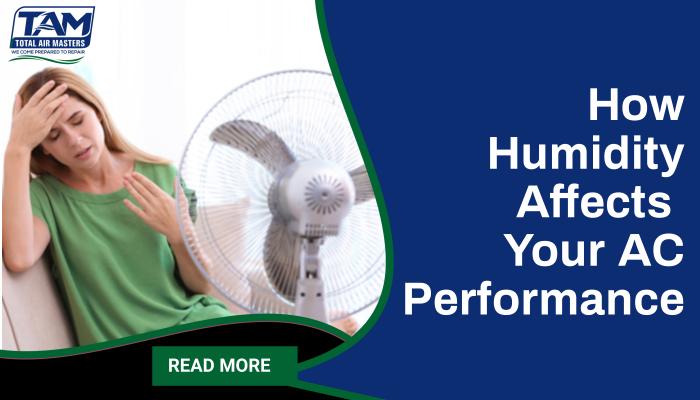
Humidity plays a big role in how well your air conditioning system works. When the air is too humid, your AC has to work harder to cool your home, and this can cause problems. Understanding how humidity affects your AC system is important to keep your home comfortable and your energy bills low.
High humidity can make your AC less efficient and cause it to run longer than it should. This extra strain can lead to wear and tear on your unit, making it more likely to break down. It can also make your home feel warmer than it really is, even if the thermostat says it’s cool. Managing the humidity levels in your home can make a big difference in how well your AC works and how comfortable you feel.
By knowing the signs of humidity problems and taking steps to control them, you can keep your AC running smoothly. This can save you money on repairs and replacements and help you avoid the uncomfortable, sticky feeling of a humid home. In the following sections, we’ll explore how humidity affects your AC performance and what you can do about it, especially in areas like Katy, Richmond, and Sugar Land, where the summers can be hot and humid.
The Relationship Between Humidity and AC Performance
Humidity has a significant impact on your AC’s performance. When the air inside your home is humid, it contains a lot of moisture. Your air conditioning system works by removing both heat and moisture from the air. However, when there’s too much humidity, your AC has to work harder to cool your home effectively. This extra load can reduce the unit’s efficiency, making it run longer and use more energy, which can increase your utility bills.
Moreover, high humidity levels can cause your AC system to wear out faster. The constant effort to dehumidify the air puts additional strain on the components, leading to more frequent repairs and a shorter lifespan for your unit. This is why it’s important to understand how humidity controls affect your AC’s performance. Proper maintenance, including regular filter changes and coil cleaning, can help your system handle high humidity better.
Additionally, a high-humidity environment can lead to uncomfortable indoor conditions. Even if your AC cools the air to the set temperature, the moisture in the air can make it feel warmer and stickier inside. This can prompt you to lower the thermostat even further, putting more strain on your AC system. Balancing your indoor humidity levels is crucial for both comfort and energy efficiency.
Signs That Humidity is Affecting Your AC
It’s important to recognize when humidity is interfering with your AC’s performance. One clear sign is if you notice your home feels clammy or sticky despite the AC running. High humidity can make the air feel warmer and less comfortable. This often means your AC is struggling to remove the excess moisture from the air, indicating it might need maintenance or adjustments.
Another sign is that your AC runs constantly without actually cooling your home effectively. If the unit is operating non-stop but the temperature never seems to reach the set level, this could be a result of high humidity. The air conditioning system might be working harder to remove the moisture, thereby running longer cycles, which can result in increased wear and tear.
You might also observe higher energy bills. When humidity makes your AC work overtime, it consumes more electricity, driving up your energy costs. If you see a sudden spike in your utility bills without any other explanation, it could be due to high humidity affecting your AC’s efficiency.
Check for musty odors as well. High humidity can lead to damp conditions that promote mold and mildew growth. If you detect a persistent musty smell in your home, it might be the result of excess moisture, and your AC system might not be removing humidity as efficiently as it should. Keeping an eye out for these signs can help you address humidity issues early, ensuring your AC remains effective and your indoor environment stays comfortable.
How to Manage Indoor Humidity Levels
Managing indoor humidity levels is crucial for maintaining a comfortable and efficient home. One effective way to control humidity is by using a dehumidifier. A dehumidifier works by removing excess moisture from the air, making it easier for your AC to cool your home. You can choose between a portable unit for individual rooms or a whole-house dehumidifier that works with your existing HVAC system.
Another strategy is to improve ventilation in your home. Proper ventilation helps reduce humidity by allowing moist air to escape and bringing in drier air. Using exhaust fans in the kitchen and bathrooms can help remove moisture quickly, especially during cooking and showering. Make sure to keep these fans running long enough to dissipate the humidity.
Sealing leaks and insulating your home also play a role in managing humidity. Gaps around windows and doors can let humid air enter, making your AC work harder. Insulating your home properly prevents outdoor air from affecting indoor conditions. Additionally, regular maintenance of your AC system, like cleaning coils and changing filters, ensures that it can handle humidity more effectively.
When to Consider AC Repair or Replacement
Sometimes, managing humidity levels isn’t enough, and you might face persistent issues with your air conditioning system. It’s essential to know when to consider AC repair or replacement. If your AC frequently breaks down, needs constant repairs, or doesn’t cool your home effectively, it might be time to call a professional.
Another sign to consider repair or replacement is the age of your AC unit. Most AC systems last about 10-15 years. If your unit is approaching this age and struggles to manage humidity, upgrading to a newer, more efficient model can solve your problems. Newer units are designed to handle humidity better and are more energy-efficient, saving you money in the long run.
High energy bills that don’t correspond to your usage can also indicate that your AC might need repair or replacement. An inefficient system works harder to cool your home, driving up costs. A professional assessment can determine if your unit can be repaired or if a replacement is the better option.
Conclusion
Understanding how humidity affects your AC performance helps you take steps to maintain a comfortable home environment. From managing indoor humidity levels with dehumidifiers and proper ventilation to recognizing when it’s time to consider AC repair or replacement, these measures ensure your air conditioning system operates efficiently.
At Total Air Masters, we specialize in AC repair and replacement in Katy, Richmond, Sugar Land, and surrounding areas. If you notice signs that humidity is affecting your AC performance, don’t wait. Contact Total Air Masters today for professional advice and services to keep your home cool and comfortable all summer long.
